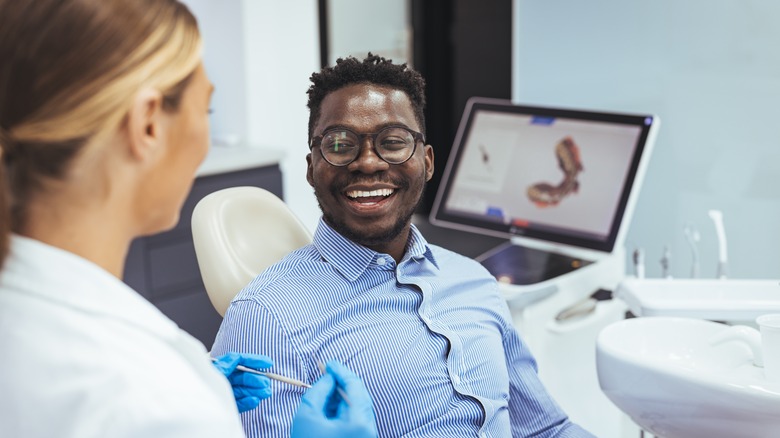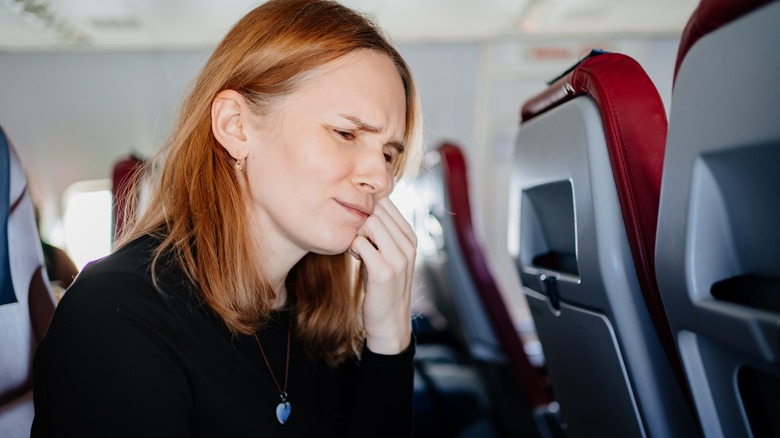Few things are as dreaded as getting dental work done. The startling sounds during the procedure, the sore gums after, the days of following a liquid diet — if you’ve had dental surgery before, you likely don’t need us to paint a picture of the (mildly traumatic) experience for you.
To make matters worse, dental work can get in the way of your travel plans, and is a mistake to avoid when traveling by plane. Boarding a flight soon after visiting the dentist can interfere with your healing time and could cause painful complications.
To understand why, we reached out to Katrina M. Sanders, a registered periodontal hygienist and international speaker, for expert insights. As Sanders shared in an exclusive interview with Explore, extractions are especially prone to travel-induced complications. “The greatest concern we have in a patient flying shortly after a procedure such as an extraction actually has to do with the cabin pressure within the plane, and its impact on the extraction site,” the dental hygienist explained. “The build-up of pressure within an extraction site could release the blood clot that we want to form there, which elevates the patients’ risk for a dry socket (a very painful and uncomfortable postoperative complication some extraction patients experience).”
Travel can interfere with post-op treatment

Even if you survive your flight without any issues, vacationing far away from your dentist could still put you at risk. Katrina M. Sanders told us exclusively that dental professionals can offer only limited follow-up care for patients who choose to travel shortly after oral surgery. “While sometimes my patients think they can just call and give a list of symptoms over the phone, oftentimes that just doesn’t give us enough guidance to better understand what the complication is,” she revealed. “Even sending blurry photos taken from a phone really doesn’t give us the clarity that seeing the patient, palpating the lymph nodes around the area, observing changes in the tissue, or taking an X-ray would.”
If an infection develops, or if you run into unforeseen side effects of your procedure, you might have to scramble to find an available dentist or dental hygienist in your destination — and, unfortunately, they may not be able to offer the thorough and personalized treatment a familiar doctor can. This can be especially risky for those who are immunocompromised or on immunosuppressant medications, Sanders noted. To be safe, it’s best to postpone air travel until your dentist gives you the go-ahead.
If you fly, carefully follow doctor’s orders

Sometimes, unavoidable emergencies — and trips planned long in advance — occur just after a dental procedure. If you must fly shortly after having dental work done, Katrina M. Sanders suggested following your dentist’s orders to a T. This can include instructions to limit or stop smoking, take prescribed medications, and avoid hard or sticky foods. “All too often, the adverse events we observe are unfortunately due in part to the patient not following all steps or directions as we had offered them,” Sanders told us exclusively.
Be sure to also follow your standard oral hygiene routine as allowed by your dentist. Sanders recalled a time when she didn’t have access to her go-to products during a trip: “One time I was forced to check my bag instead of carrying it on, and wouldn’t you know it: The airline lost my luggage. I had to use the hotel toothpaste and brush when I arrived, and this was the hardest bristled brush I’ve ever brushed with in my life! I am surprised I still have gums left after that experience!” If your mouth is extra sensitive after dental work, be sure to pack a high-quality soft toothbrush, toothpaste, and any other items (such as water flossers) recommended by your dentist or dental hygienist.

